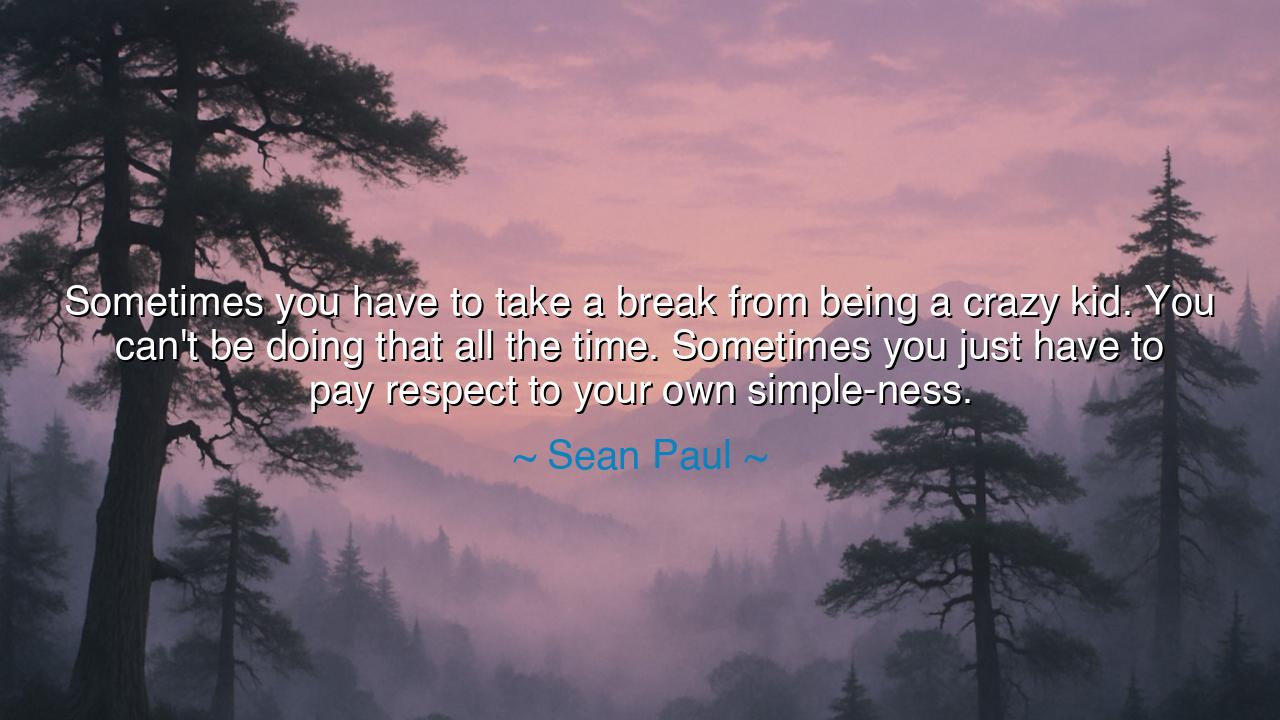
Sometimes you have to take a break from being a crazy kid. You
Sometimes you have to take a break from being a crazy kid. You can't be doing that all the time. Sometimes you just have to pay respect to your own simple-ness.






Hear the words of Sean Paul, artist of rhythm and voice of a generation: “Sometimes you have to take a break from being a crazy kid. You can't be doing that all the time. Sometimes you just have to pay respect to your own simple-ness.” Though spoken lightly, they carry the gravity of timeless wisdom. For within them lies a lesson about balance, about honoring both the fire of youth and the calm of simplicity. To be always wild is to burn out; to never rest is to lose the self. He teaches that joy and freedom must be tempered with moments of stillness, where one returns to the roots of being.
The meaning is clear: life is not only about excess and frenzy, but also about simplicity and rest. The soul, like the body, cannot thrive if it is forever driven at full speed. There must be pauses, moments of quiet, times when one honors the ordinary—eating humbly, walking slowly, breathing deeply. In such simplicity, strength is restored, and the heart is made ready once more for life’s battles. To ignore this is to invite exhaustion and despair.
History gives us many mirrors to this truth. Recall the tale of Marcus Aurelius, emperor of Rome, who in the midst of ruling armies and empires kept a private journal of meditations. He knew the storm of power and duty could consume him, so he sought refuge in the simple-ness of thought, grounding himself in philosophy and humility. His greatness was not only in his victories, but in his balance—his ability to step back from being “a crazy kid” on the throne of the world, and to return to the calmness of his own soul.
Consider also the story of Siddhartha Gautama, the Buddha. He lived first as a prince surrounded by every indulgence, and then as an ascetic, denying himself even the simplest of pleasures. In both extremes he found no peace. Only when he discovered the Middle Way, honoring both the necessity of joy and the sanctity of simplicity, did he awaken. Sean Paul’s words echo this same truth: to live well is to embrace balance, not to remain trapped in one extreme.
The lesson for us is plain: we must learn to respect simplicity. In a world that glorifies excess—more wealth, more fame, more excitement—there is profound wisdom in stepping back to honor the ordinary. To eat a meal without hurry, to rest without guilt, to find peace in silence—these are acts of strength, not weakness. For the one who respects their own simplicity carries within them a wellspring of energy, while the one who never pauses will soon collapse beneath the weight of endless frenzy.
Therefore, child of tomorrow, take heed: be wild when the time calls for wildness, but do not despise the quiet. Dance when your spirit yearns to dance, but also learn to sit still when your spirit longs for calm. Respect yourself not only in your moments of glory, but in your moments of simplicity. For true respect begins not with the applause of others, but with the gentleness you show yourself.
To live by this teaching, practice both rhythm and rest. Allow yourself laughter, adventure, and freedom, but also carve out moments of solitude. Walk in nature, breathe in silence, or sit with loved ones without pretense. In these small acts you will discover the beauty of your simple-ness, and from it you will draw strength to return again to the joys and challenges of life.
Thus, the words of Sean Paul endure: “Sometimes you just have to pay respect to your own simple-ness.” Let them remind you that life is not measured by constant motion, but by balance. In honoring both the fire of joy and the calm of simplicity, you will find not only peace, but the fullness of living well.






AAdministratorAdministrator
Welcome, honored guests. Please leave a comment, we will respond soon